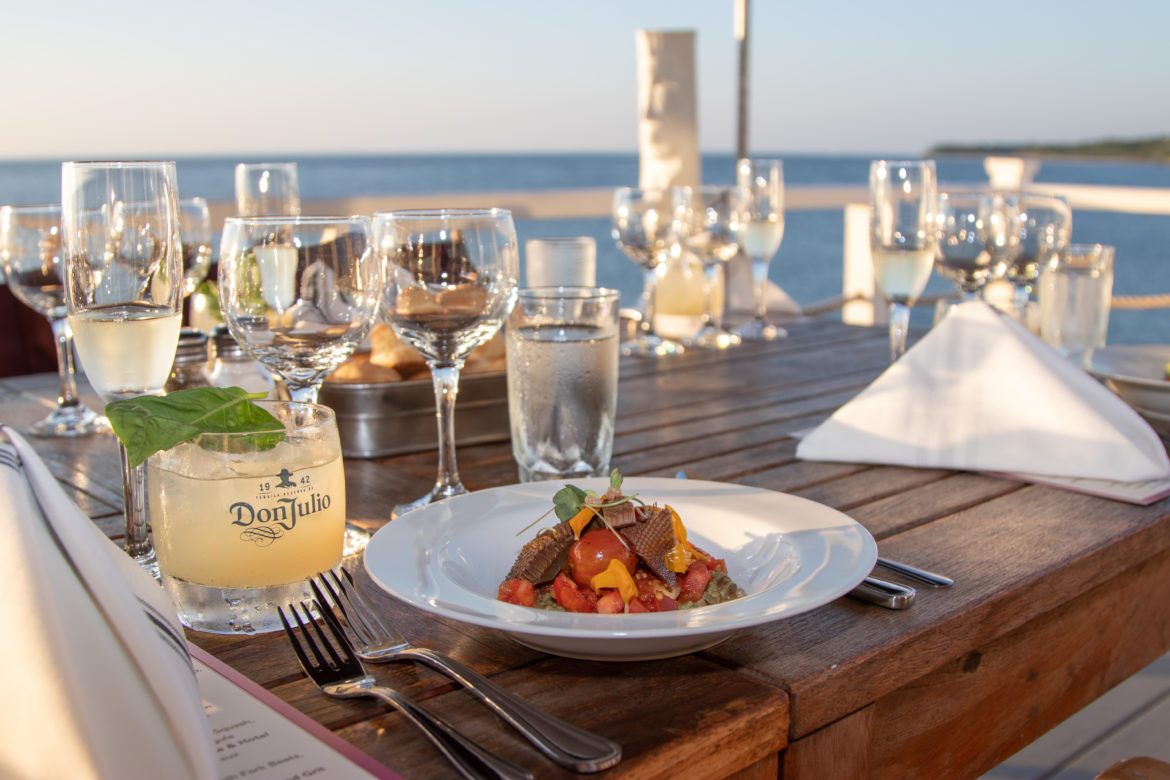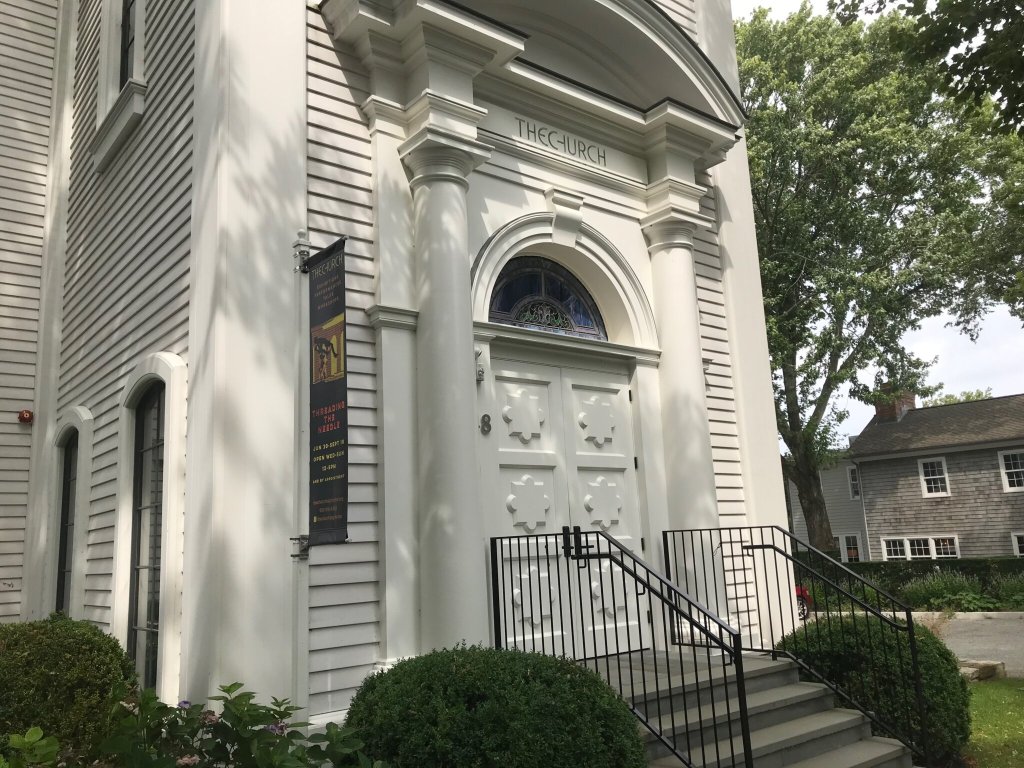Six Decades of Food & Wine on the East End

Sustainable farming, vineyard restaurants, farm- and sea-to-table dining, craft beer tastings…these are just a few of the trends that have swept foodies off their feet here on the East End in recent times, and there are many more sure to come. The culinary culture of the Hamptons and North Fork has continually evolved over the past 60 summers, a testament to both the bounty of our local land and waters and the talented people working their magic all along the food chain, as it were.
Dan’s Taste of Summer has showcased this excellence with world-class culinary events for the past nine years, and we continue that celebration as these true local tastemakers take on the history and future of dining, farming, brewing, winemaking and more on the East End.
What stands out to you about the history of the East End culinary scene, and how has it evolved over time?
Claudia Fleming, Owner of the North Fork Table & Inn: I think the resurgence in the farming community! So many new and passionate farmers dedicated to sustainable farming, organics and, in some cases, biodynamic farming! This in turn has created a more local and seasonal dining scene. It’s the reason my late husband, Gerry Hayden, and I moved the the North Fork 15 years ago.
Amy Halsey-Cohn, Owner of the Milk Pail: Agriculture on the East End has adapted and evolved with the times for many, many years. As the area developed and wholesale commerce became more and more difficult, the agricultural community adapted to mainly retail operations after generations of wholesaling. In today’s market, there is less and less land to harvest from, and also busy lifestyles are not producing customers who are in the kitchen as much.

Andrea Anthony, Owner of the Lobster Roll aka “Lunch”: The culinary arena out here has evolved and diversified throughout the years. It’s very exciting to see how the area has transitioned. Many new restaurants have emerged showcasing myriad cuisines, and that’s a great thing for the Hamptons. The East End is a unique, one-of-a-kind destination attracting travelers near and far with all we have to offer—restaurants, wineries, breweries, farmstands, amid beaches, farmland and quaint little town. Why go anywhere else? Long live the Hamptons!
Roman Roth, Wölffer Estate Winemaker: The biggest change over the years has been that Wölffer Estate has overcome the prejudice against Long Island wines. New Yorkers are now proud of the wines we make.
Our vines have matured, we had a very successful generational change with Joey and Marc Wölffer taking over the winery after the sad and untimely loss of our founder Christian Wölffer, and we have put together a fantastic team over the years and have built a wonderful innovative brand. When we started in 1988, nobody believed that we would be able to do this and become a household name that can stand up to the best in the world.
Louisa Hargrave, Founder of Hargrave Vineyard: It’s never possible to see the future, and I would say that I’m very pleased with the way I see the wine. The people who grow grapes, and the people who grow food and the people who appreciate both, really make a synergy that was the most unexpected thing for me. We wanted to make really great wine, but we couldn’t anticipate that this was a whole dynamic of food and wine that really characterized the region. McCall Wines is raising Charolais beef, and they’ve preserved a whole lot of farmland. That land preservation is part of it, because to recognize how important the land is for farming is part of the whole equation.
Richard Vandenburgh, Co-Owner of Greenport Harbor Brewing Company: The East End has always been an amazing place for agricultural and aquacultural success with a long and rich history of hard-working and authentic family traditions. It’s not surprising to me that the rich landscape and open spaces were appealing to the vineyard owners, baymen, oyster farmers and entrepreneurs who wished to put down roots in a place that has had a mystique of bucolic and simple living.
As the East End continued to be discovered, the influx of tourists, day trippers and second home owners supported the growth of those industries, while at the same time seeking out more and diverse experiences. Our decision to open a brewery was selfishly pursued because there weren’t great beer options available on the East End. It just so happened that our decision coincided with the explosion of the craft movement and a hyper focus on the farm-to-table (or grain-to-glass) movement. The interest in knowing what you’re eating or drinking and where it comes from fueled this local growth even more.
How do you see East End agriculture and the local dining scene today?

Claudia Fleming: In a word…exciting! There is so much talent in both the restaurant and farming community, it feels like we’re all inspiring one another to do our best work! It’s very gratifying to be a part of such a vibrant culture. Honestly, I can’t imagine 60 years from now—I do hope we begin to take the stewardship of our world seriously, so that this exquisite region we call home will be as magical a place as it is now!
Amy Halsey-Cohn: East End agriculture is now several things. Large-scale hobbyists with expendable money are providing the landscape community with great gardens to plant and harvest. Private chefs are then preparing the harvests from these gardens for a family directly. Traditional farms are ever adapting to clients’ needs and wishes. Farmers are having to step out of the growing-box and into finished products as well. Less consumers have the time and/or desire to cook. Farms are looking toward prepared items to promote their harvests.
Agriculture will soon be expanding into people’s homes, and inside living walls will be common in the near future. Pressure from big box stores and online markets will also push the envelope that much further.

Roman Roth: The most amazing achievement is how many young people love Wölffer Estate and our wines. With our beautifully designed labels and our elegant rosé wines and ciders, we have captured everybody’s hearts. In the meantime, we are working hard to continue to improve our high quality white and red wines. This is a fantastic foundation to look optimistic at the future. We will reach out further and further (internationally) to continue to grow our reputation and the image of Long Island wines in general. We are family owned and are focused on quality—willing to take risks and ready to make fast discussions. But we will also have to worry about climate change and the associated dangers of more severe weather patterns.
On the one hand, the warmer weather has allowed us to ripen fruit earlier and get riper over the last 31 years and, therefore, combined with our elegant maritime influence, make world-class wines that are among the most food-friendly wines in the world and also have great structure and longevity. On the other hand, we will have much more severe rainstorms or the most dreaded—hurricanes. This will be our challenge to overcome and let the world know that in the normal and good years we are making super wines, and in the tricky years, it will show who can handle and deal with adversity.
Richard Vandenburgh: In the 28 years of my time on the East End, I feel the culinary scene continues to mature and attract new and innovative talent. The influx of diverse and culturally rich influences also provides options not experienced before. You could dine out almost every night and not have the same experience. From high-end to simple and elegant to take home fresh, there is no lack of options. Added to this are the exceptional catering options that make any party even more authentic and real. It continues to be a fun place to discover what’s new and try dishes where local ingredients from field and sea connect the diner to the local terroir in a way that is super appealing and fresh.
What is the future of the East End culinary scene, and how will it grow or change in years to come?
Amy Halsey-Cohn: The passion for farming is in one’s blood and very hard to explain to those not as close to the earth. In a farmer’s life there are little miracles every day. Every spring, tiny seeds bring forth life and remind us to live. The summer produces the first harvests and feeds our souls. The fall finishes the harvest and reminds us to be thankful with our mouths full. The winter brings peace and rest to begin the circle of life again. The future of agriculture on the East End is up for grabs. With ever-declining farmland to farm and more and more rules to follow, it will be a challenge for the next generation. Costs may end up proving prohibitive to continue in an area that should be full of opportunities. Time will tell, and change is inevitable. One day at a time.

I can only hope more people will start to understand farming is a process that takes great care and responsibility. These items don’t just show up in the grocery store with no effort. Less than 2% of our population, last time I checked, feed the rest—it’s something to preserve, protect and respect.
Louisa Hargrave: There’s a change I see in farming overall, where it used to be—you’d get 30 acres; you’d plant them up; and you’d make a few noble wines, merlot and chardonnay and so on. What I see today goes along with this idea of the dynamic between food and wine—which you can see clearly with Wölffer, but you also see it with McCall Wines on the North Fork. There are people who aren’t just doing wine; they’re having a restaurant; they’re doing things with style; they really are imagining the wine that they’re making to be part of something that’s much greater.
It shows an understanding of the economic situation. We don’t make bulk wine here. The land is too expensive, and the quality is very high, so you’re looking at a high-end product. I hope to see more people who are doing things on a smaller scale that is more similar to the Burgundy model, where it’s a small property doing something of very, very high quality and not just a big bottle for the tourist trade. That’s the direction that I find really exciting. That’s not to say it can’t be done on a large scale, but I think that the vibrancy and the energy in the flavors of the wine deserve attention and really match with the food that’s grown here…My son Zander is the winemaker at Pellegrini Vineyards, and for me to go and taste his wines and to see how exciting they are is part of the fulfillment I see in the next generation that’s carrying it forward.
Richard Vandenburgh: I feel like it will be more of the same. I hope that the diversity remains and the opportunity for affordable, honest and good value does not succumb to high-priced, aloof scenes that cater only to the wealthy. I enjoy sitting down in a place that caters to everyone; it just feels more genuine and honest to me. A place that values rockbed principles and feeds the soul in preserving those traits is the place I would go every day.



